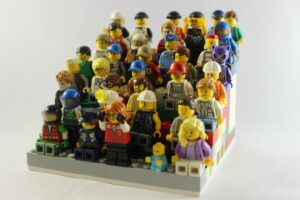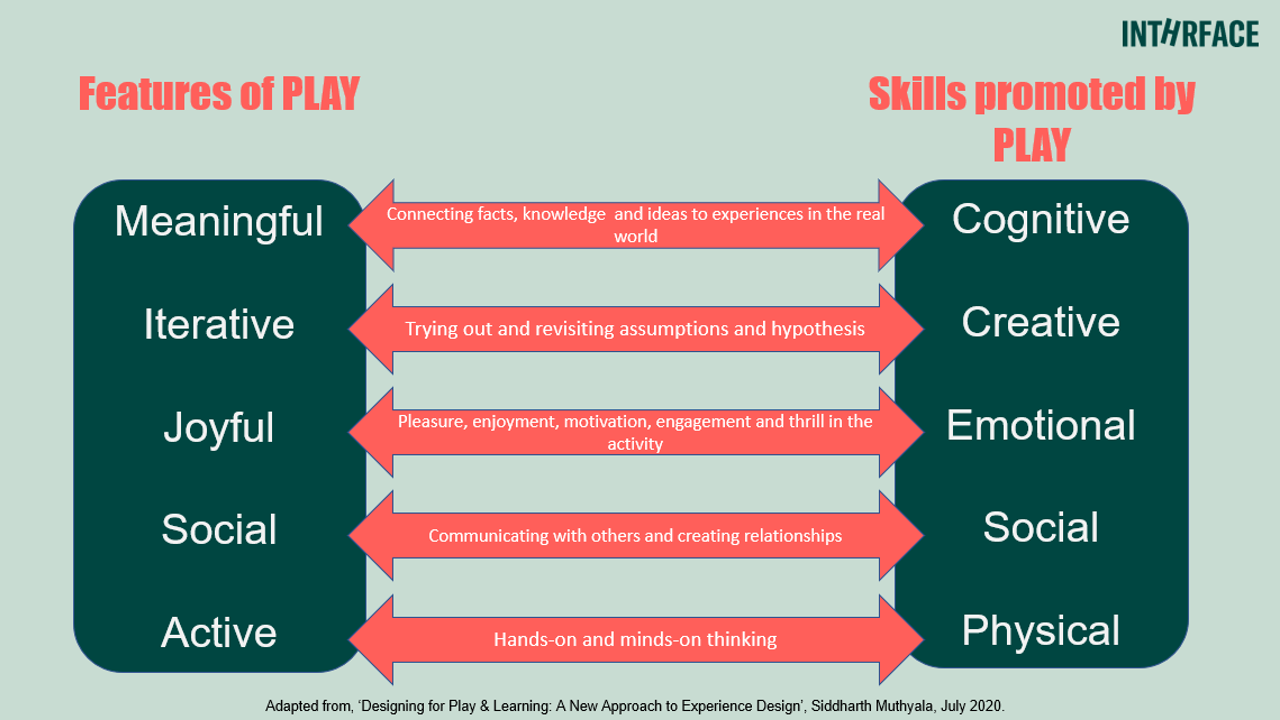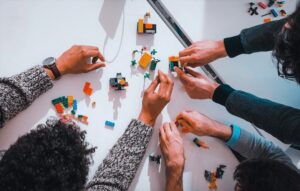In Inthrface, we believe that play and solving complex organizational challenges go hand in hand. Although contradictory in the serious environment of work, play is an important tool to help people in organizations deal with complexity and uncertainty in an imaginative way and act on it with commitment and confidence. However, many ask us why they should play at work, and how it can be done now that half the world’s population works at home?
 We are change consultants specialized in the LEGO® SERIOUS PLAY® methodology and we have used the methodology successfully in more than 1000 workshops worldwide. In our practice we have seen time and time again that traditional long-range planning based on analytical thinking and predictions of the future are not helpful when uncertainty is lurking around the corner. Instead, organizations can make better use of a
We are change consultants specialized in the LEGO® SERIOUS PLAY® methodology and we have used the methodology successfully in more than 1000 workshops worldwide. In our practice we have seen time and time again that traditional long-range planning based on analytical thinking and predictions of the future are not helpful when uncertainty is lurking around the corner. Instead, organizations can make better use of a
holistic set of skills, harnessing the cognitive, creative, emotional, social, and physical abilities of their workforce.
Everyone has practiced these skills while playing as a child and we know from experience that a playful environment automatically triggers them in adults. Creating such an environment in an organizational context is exactly what Johan Roos and Bart Victor wanted to achieve when developing SERIOUS PLAY, “… a mode of activity that draws on the imagination, integrates cognitive, social and emotional dimensions of experience, and intentionally brings the emergent benefits of play to bear on organizational challenges.” (Roos & Victor, 2004).
Inspired by an article published by LEGO Ventures about designing better playful learning experiences, we have created a visual of how play promotes specific skills and in doing so facilitates the creation of positive experiences with lasting impact in relation to complexity and uncertainty.

Answering the first question, why play in the serious context of work, is about consciously using the features of play to harness skills that are crucial in a complex and uncertain world (or just call them a 21st century skillset). Therefore, when designing workshops, or any form in which people sit together to discuss future aspirations and next steps, leaders, consultants and/or facilitators should engage participants in:
- an activity that helps them in finding meaning in what they are doing, allowing them to put all the facts, knowledge, and ideas on the table, and connecting them to experiences in the real world. This is about exploring what people know, what they have seen and heard, making sense of this, and identifying solutions and opportunities.
- an activity that helps them with iterative thinking: experimenting, challenging the assumptions, testing out hypothesis and exploring possibilities without fear and anxiety for consequences in the real world.
- an activity that is enjoyed, where participants feel motivated and committed to the process, an activity that engages them with minds and hearts.
- an activity which is socially interactive, in which thoughts and ideas can be shared freely, allowing them to build relationships.
- an activity in which the hands lead and the mind follows, in doing so unleashing the imagination and unlocking knowledge.
 The answer to the second question, how to do this when so many are working from home, is quite simple. You need a space where people can come together and discuss: whether you meet in your boardroom at the office, in a meeting room at a fancy location or in an online space doesn’t really matter (we have written about online workshops before, you can read the article here).
The answer to the second question, how to do this when so many are working from home, is quite simple. You need a space where people can come together and discuss: whether you meet in your boardroom at the office, in a meeting room at a fancy location or in an online space doesn’t really matter (we have written about online workshops before, you can read the article here).
You also need a physical media to activate the hand – mind connection during your workshop. That is why at Inthrface we use LEGO® in most of our workshops: LEGO® is familiar to most people and you can easily put things together, take them apart and start again, a process similar to what happens in our brain when we construct knowledge.
The pandemic has forced many to short-term thinking to keep afloat as a team or as a business. Now, the next challenge is already on the horizon: what will become the ‘new corporate normal’ and how should we respond to it in a way that leads to sustainable results for our businesses and happiness for the people who work there? Solving a complex challenge like this through play is a serious matter to consider. The features of play promote distinct skills that are crucial for both individuals and organizations when dealing with complexity and uncertainty in their organizational context. Compared to more traditional ways, the result is deeper reflections and faster results, a positive investment in building better businesses prepared for the future.

Finally, creating a playful environment in the serious context of work and capturing the added value of it is like juggling, keeping the five features of play and the five skills promoted by play in the air, focus on one and all at the same time. Juggling with 10 balls requires some exercise, this is why only the best facilitation will help you out here!
If you would like to know how we can help you with this, feel free to reach out by sending us a mail or book your free ‘creative challenger’ talk here. A creative challenger talk is a 30’ online meeting with Marc Sonnaert, Executive trainer and consultant at Inthrface. In this talk you can ask anything you would like to know about LEGO® SERIOUS PLAY® and how it could be relevant in your team, organization, or business.

